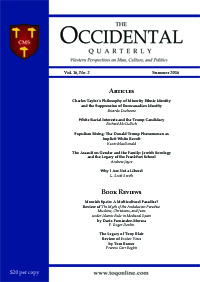From a Chat to Metapolitics: A Journey in Thought, Part Two
It seems to me that a cultural message of the following sort (the reader is invited to read it over and improve on it) needs to be communicated to white people, particularly the young:
You are white and that matters incredibly. You can be very, very proud of who you are. You owe it to yourself to learn about the best your race has thought and achieved over the span of its history so that you will know why. Being a white person carries with it responsibilities: You need to develop your mind and body and character and personal effectiveness so that you can live honorably and decently and productively as a white man or woman by the highest standards of your race. And you should feel an obligation to protect and enhance the places your forebears left to your care, and to look out for the wellbeing of your racial kinsmen.
The question, of course, is how to impart this message (or one that’s better). The first thing that comes to mind is to do what the Cultural Marxists and their liberal allies have done so effectively in recent decades through the schools and the mass media, except do it in reverse: that is, instead of tearing down whites and their ways and their heritage, build them up.
The problem with that approach, however, is that anybody disposed to go in that direction would not have ready access to the schools and to the mainstream media. Entities that train and license teachers and the schools that hire them have zero tolerance for white consciousness and commitment, and white activists don’t control movie studios, television networks, newspapers, and record labels. Also, going public with anything favorable about white people is dangerous: it’s a way to get smeared, harassed, snubbed, and marginalized, and to lose your job or not get the one you applied for, as well as to get rejected in school applications. The evidence demonstrates that those who have advocated for whites under their own names—no exceptions I can think of—have paid heavy dues for it. Read more

 For its fourth anniversary issue in the fall of 2016, Le Harfang, a French Canadian white nationalist publication, invited foreign contributions from a number of people, including me as an American. We were tasked with producing an article that 1) speaks to how the contributor sees the world for white people “in four or forty years,” and 2) offers advice on how to prepare for tomorrow’s world. Length was up to me, and Le Harfang’s editor would trim what I wrote if need be as he translates my English into French. I replied that I’d give it a go. This writing shares my response to the Le Harfang charge with an English speaking audience.
For its fourth anniversary issue in the fall of 2016, Le Harfang, a French Canadian white nationalist publication, invited foreign contributions from a number of people, including me as an American. We were tasked with producing an article that 1) speaks to how the contributor sees the world for white people “in four or forty years,” and 2) offers advice on how to prepare for tomorrow’s world. Length was up to me, and Le Harfang’s editor would trim what I wrote if need be as he translates my English into French. I replied that I’d give it a go. This writing shares my response to the Le Harfang charge with an English speaking audience.



